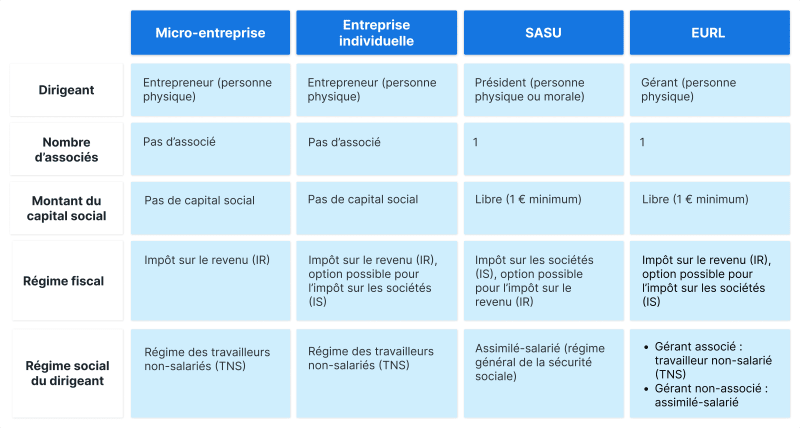What is a freelancer?
Unlike an employee, a freelancer is an independent worker who carries out his or her activity autonomously, without being bound by an employment contract with the company for which he or she carries out the assignment. They work on behalf of several customers, often on one-off or short-term assignments.
He is autonomous in managing his own schedule, choosing his customers, and setting his own prices.
There is no legal definition of freelance status: freelancers can operate either as sole proprietorships or as companies(SASU or EURL).
Why become a freelancer?
Freelancing offers many advantages, but there are also a few disadvantages to consider before launching your business.
Benefits
There are several advantages to freelancing:
-
flexible and autonomous organization: freelance work offers great flexibility in terms of scheduling and location. In addition, freelancers are in no way subordinate to their customers, which means they can be completely autonomous and work for several clients;
-
choose your clients and assignments: freelancers are free to choose the clients they wish to work with and the assignments they wish to carry out, whether they be short or long-term;
-
Set the rates for your services: freelancers are free to set the price of their services according to their skills and expertise;
-
set up a business easily: sole proprietorships and micro-businesses are particularly well-suited to freelancers, with simple, fast and inexpensive set-up formalities;
-
turn your profession into a passion: freelance work allows those who wish to do so to turn their passion into a source of income and fulfill themselves in an activity that corresponds to their aspirations.

Disadvantages
The freedom offered by this status does, however, have a few drawbacks:
-
unstable income: freelancers have no fixed remuneration, and their income can fluctuate depending on the number of clients, the duration of assignments and the rates applied, which can lead to financial instability and stress;
-
no unemployment benefits : unlike salaried employees, freelancers don't contribute to unemployment insurance, which means they have no financial protection in the event of a drop in activity or lack of income;
-
Difficulty accessing finance: freelancers sometimes find it difficult to obtain loans or finance from banks, as their professional situation is perceived as less stable;
-
risk of work overload: as a freelancer, it's sometimes difficult to strike a balance between professional and personal life, especially given the large number of projects to manage and the sometimes tight deadlines.
Freelance work: advantages vs. disadvantages

What are the conditions for becoming a freelancer?
There are no special conditions for becoming a freelancer. You simply need to have an idea in mind, choose a legal status and register your company to be able to exercise your activity legally.
In practice, it's essential to have the skills required in the sector you want to work in.
It therefore makes sense to turn to an activity that you already master, or to undergo training to acquire the skills you need to carry out the assignments you'll be asked to do. It can therefore be difficult to start out as a freelancer without experience in your chosen field.
Finally, it's important to check beforehand whether your chosen activity is a regulated one. If so, you'll need to obtain the necessary authorizations.
What kind of work can I do as a freelancer?
More and more freelancers are turning to activities requiring a high level of skill. It has to be said that the range of activities that can be carried out as a freelancer is extremely diverse. Here's a list of professions that can be practiced under this status:
There are many activities that are compatible with freelance status. However, some of them are subject to specific regulations and require authorization. Here is a non-exhaustive list of regulated activities:
-
legal professions: lawyers, notaries, court commissioners, administrators and court-appointed agents, court clerks.
-
medical professions: doctors, dental surgeons, midwives, pharmacists, masseur-physiotherapists, dieticians.
-
technical professions (other liberal professions): chartered accountant, statutory auditor, surveyor, industrial property attorney, architect.
These professions, known as "regulated activities", are subject to specific conditions of access. Their exercise is governed by legislative or regulatory provisions that are important to know before embarking on your project.

What legal status should you choose to start a freelance business?
Choosing the right legal status is a crucial step in freelancing. It depends on your activity, your needs and your financial resources. You can set up a freelance business :
- by creating a sole proprietorship (EI ) or a micro-business;
- or by creating a one-person company (EURL or SASU).
It's important to find out about the different legal statuses available to freelancers.
Sole proprietorship or micro-business
Freelancers need to choose a status that allows them tocarry on their business alone. A sole proprietorship (EI) can be a wise choice, as the formalities involved in setting up a business are less restrictive than those for a company.
A sole proprietorship allows you to run your business under your own name. In other words, it's directly linked to you, the individual. Unlike a company, a sole proprietorship does not involve the creation of a legal entity. As a result, you don't need to draw up articles of association or set up share capital.
It is impossible to create several sole proprietorships (1 sole proprietorship = 1 person), unlike companies.
If you decide to set up a sole proprietorship, you can choose between :
-
the classic sole proprietorship, under the actual or controlled declaration system;
- the simplified micro-enterprise schemeif your sales do not exceed a certain amount.
A micro-enterprise is a sole proprietorship with a simplified system. It allows you to benefit from simple, low-cost management, reduced social charges, basic VAT exemption and an advantageous tax system.
To qualify for the micro-enterprise scheme, your annual sales must not exceed (thresholds applicable for 2023, 2024 and 2025):
-
188,700 for the sale of goods, the sale of goods for consumption on the premises and the provision of accommodation;
-
77,700 for services in the industrial and commercial profits (BIC) or non-commercial profits (BNC) categories.
As a micro-entrepreneur, you can carry out a commercial, craft or liberal activity. However, the micro-entrepreneur scheme is incompatible with agricultural activity.
Single-member company (EURL or SASU)
If you want to run your business alone, you can choose to set up a one-person company, i.e. with just one partner. This can be :
- a société par actions simplifiée unipersonnelle (SASU);
- or a one-man limited liability company (EURL).
These two types of company are legal entities, separate from you (an individual). They enable you to separate your personal assets from your business assets.
Comparison table: EI, micro-entreprise, SASU or EURL?

How do I become self-employed?
The steps involved in becoming a freelancer vary according to the legal form chosen:
- becoming an auto-entrepreneur is very simple and inexpensive;
- to set up a one-person company, the formalities are more onerous.
Becoming a freelance micro-entrepreneur
Setting up a micro-business couldn't be easier. Just follow these simple steps:
-
Step 1: declare your activity on the Guichet unique website, to request registration of your micro-enterprise on the Registre National des Entreprises (RNE) ;
-
Step 2 : create your space on theURSSAF website to process your future sales declarations;
-
Step 3: receive the documents identifying your company: your SIRET number (15 days on average) and your URSSAF affiliation notification (between 4 and 10 weeks).
Once these steps have been completed, you can finally start your business and invoice your customers!
Then, depending on the option you choose, you must declare your sales on a monthly or quarterly basis and pay your social security contributions.
Become a freelancer by setting up a company
To set up a one-person company (SASU or EURL), there are a number of steps to follow:
- choose your legal status (EURL or SASU);
-
register your company;
-
draw up your articles of association;
- deposit share capital with a bank ;
-
publish a notice of creation in a medium authorized to receive legal announcements (SHAL);
- register your company on the Guichet unique portal;
-
take out professional insurance;
-
open a bank account dedicated to your professional activity.
Once all these steps have been completed, you'll receive your SIRET number. This will enable you to legally start your freelance activity and invoice your customers.
What skills do you need to become a freelancer?
As the sole master on board, freelancers need a number of key skills to successfully develop their business:
-
Strengthen your expertise in your field of activity: it's best to choose a field of activity that you know, or even one in which you're going to excel - this doesn't prevent you from developing your expertise and acquiring new skills on a daily basis;
-
organizing and managing your time: organization is the key to success for a freelancer, especially if you have to manage several customers at the same time - to organize your time effectively, you need to prioritize your tasks and respect the deadlines set by your customers;
-
Gain visibility and develop your customer network: promoting your business is an excellent way to gain visibility and develop your customer network - to make yourself known, you can create a website, a blog or even a professional account on a social network (LinkedIn, Twitter, YouTube, etc.).
Once you've declared your activity, you need to find your first customers. Getting your first freelance contracts isn't always easy, especially in the face of ever-increasing competition! Yet this step is essential if you want to generate income quickly.
Here are some tips for finding your first assignments:
-
Expand your network: to make yourself known, don't hesitate to mobilize your network by taking part in events such as networking evenings, trade fairs organized by the CCI, or even lunches with other entrepreneurs;
-
take care of your profile on social networks: highlight your skills on LinkedIn to attract customers, and don't hesitate to approach companies that might be interested in your services;
-
use specialized platforms for freelancers: some specialized platforms can help you land assignments, by putting you in touch with companies looking for freelancers (for example, the Malt platform).
Once you've landed your first assignment, it's important to think about the rates you're going to charge.

To set your freelance rates, you can use one of two methods:
- time-based pricing, i.e. the average daily rate (ADR);
- project-based pricing.
Time-based pricing
Freelancers can be paid by the hour or by the day, depending on their activity.
Time-based pricing is most often used for long-term assignments. These projects offer freelancers a degree of stability. They know the duration of the assignment and can make arrangements with the customer. This establishes a relationship of trust with the customer.
This pricing system is based on an average daily rate (ADR). To calculate the AADR, it is essential to take several parameters into account:
- the rates charged by other freelancers in the same sector;
- social security charges and taxes to be deducted from sales;
- the estimated working time required to complete an assignment.
Once you've taken all these factors into account, you can evaluate your ARM and estimate the monthly sales you'll generate.
Project-based pricing
Project-based pricing consists of setting a price for the entire assignment requested by the customer. This pricing method is often used for short-term projects.
It's important to draw up a quote to estimate the time spent on an assignment and the tasks to be carried out.
For assignments requiring in-depth knowledge or higher value-added expertise, you can adjust your rates by increasing the price of your services.
As a freelancer, you must avoid undercharging for your services. The price of your services must be fair and in line with the quality of what you offer.
If your rates are too low, your customers may question the quality of your offer. On the other hand, if your rates are too high, you risk losing your competitive edge.
Having a global view of the competition in your sector enables you to stand out from your competitors by offering unique services, while allowing you to adjust your rates to position yourself effectively in the market.
Our tips for starting out as a freelancer
What are the pitfalls to avoid before taking the plunge?
Before launching your business, it's essential to remember the mistakes to avoid, to optimize the success of your project. Becoming a freelancer is a learning process. Rushing is never the right approach, which is why we recommend that you clearly define your objectives, your target clientele, and your distribution and communication channels before you launch.
Don't underestimate theimportance of marketing and communication to reach your customers more easily. Clearly explain your business objectives, your added value and your unique competitive advantages.
Take care to select your customers carefully so as not to enter into a dead-end business relationship and avoid unpaid bills. It's not advisable to work without signing a contract or paying a deposit.
Finally, don't neglect the many means of prospecting available to you, such as matchmaking platforms. It's important to know how to use these tools correctly, to be proactive and to go out on your own in search of customers.
What are the keys to launching a successful business?
To optimize the success of your project, you need to organize your workspace, at home or in a co-working space, for example.
Then, develop your brand awareness and online presence in several ways:
- by listing your company in various online directories and databases (online directories, Google Business Profile, Yellow Pages, etc.);
-
by creating a website, a blog, business cards, and a professional presentation that can be easily passed on to anyone interested in your services;
- by using the services ofa domiciliation companylike SeDomicilier, to benefit from a prestigious address for your head office while outsourcing your most time-consuming administrative tasks (receiving, scanning and forwarding mail).
Finally, make sure you set your prices correctly, neither too low nor too high, and adjust them as your experience grows.
What budget should you set aside to get started as a freelancer?
Becoming a freelancer always involves costs that it's important to anticipate. Costs vary according to the nature of your business and the legal form you choose.
If you choose to set up a micro-business, the formalities are free of charge. On the other hand, if you decide to set up a one-person company(SASU or EURL), you will have to pay a fee.
Here are the main costs involved in setting up a SASU or EURL:
- registration fees ;
- the cost of publishing a legal announcement;
- the cost of declaring beneficial owners ;
- the fees of a chartered accountant or a contribution auditor;
- professional insurance contracts...
What's more, depending on the nature of your business, becoming a freelancer can involve additional costs : setting up a website, purchasing invoicing software, equipment, etc.
In general, it costs between €225 and €2,500 to set up a company (SASU or EURL).
Conclusion
The freelancing market is growing exponentially. Freelancers enjoy a great deal of freedom in terms of organization, choice of clients and assignments.
Working as a freelancer also means facing many challenges! Increasing numbers of projects, heightened competition and stress management are just some of the challenges that freelancers have to face.



































